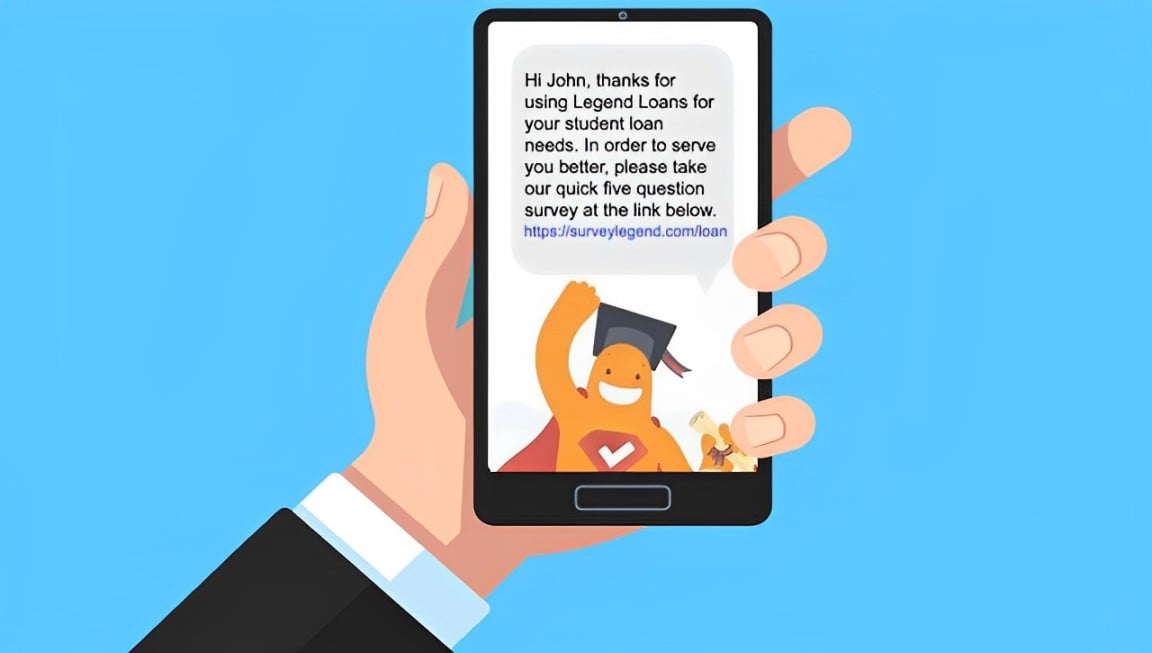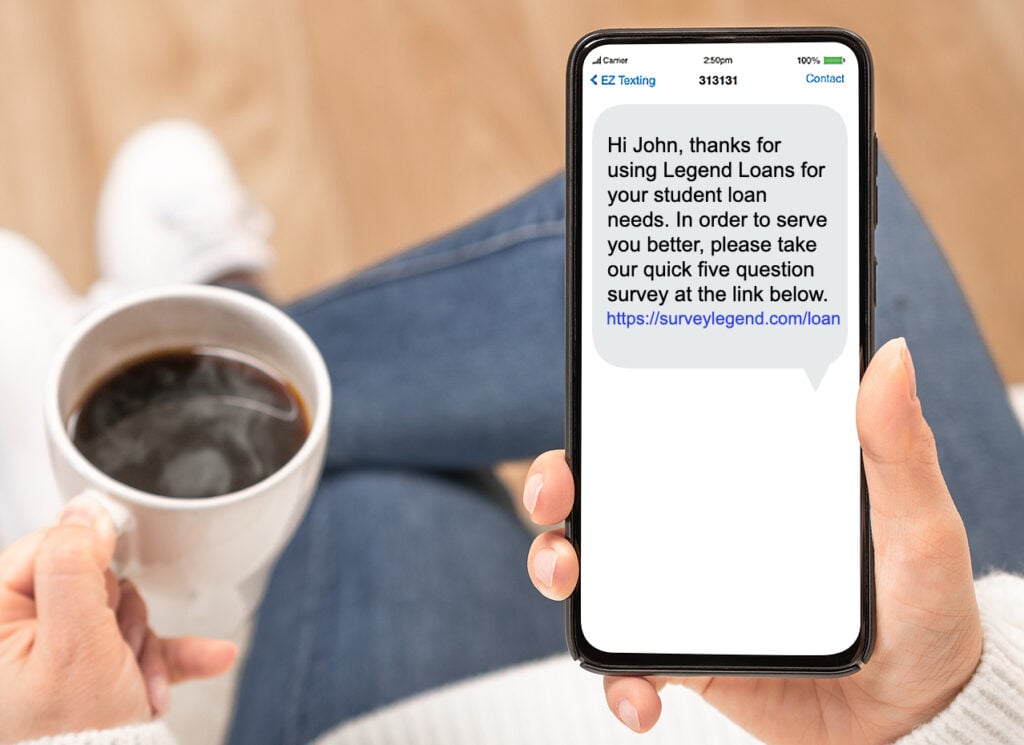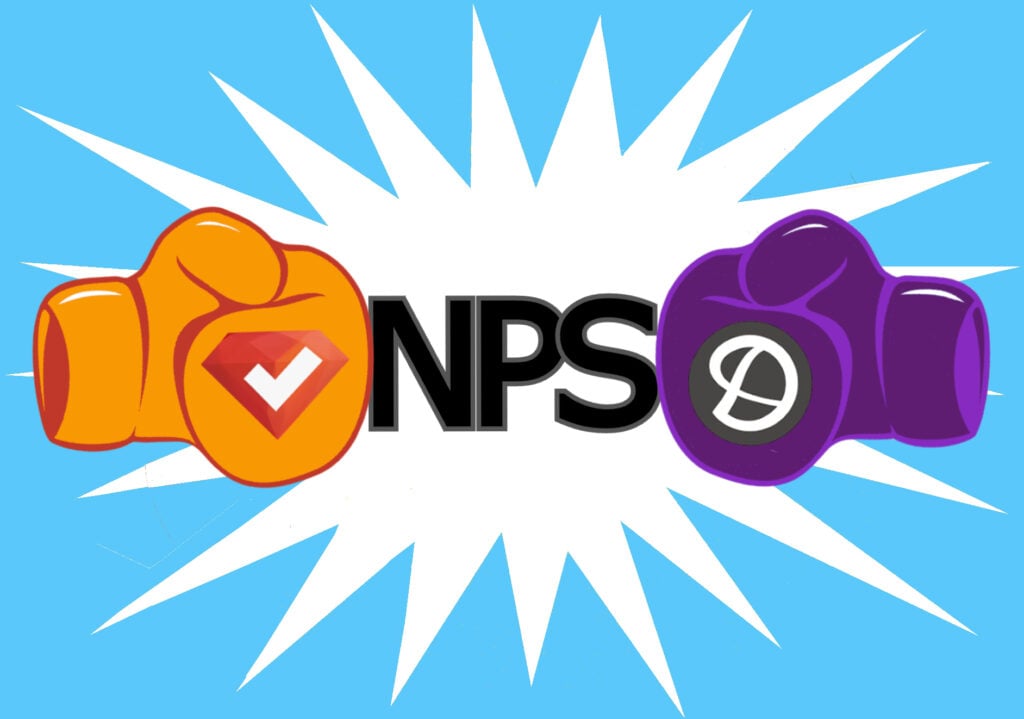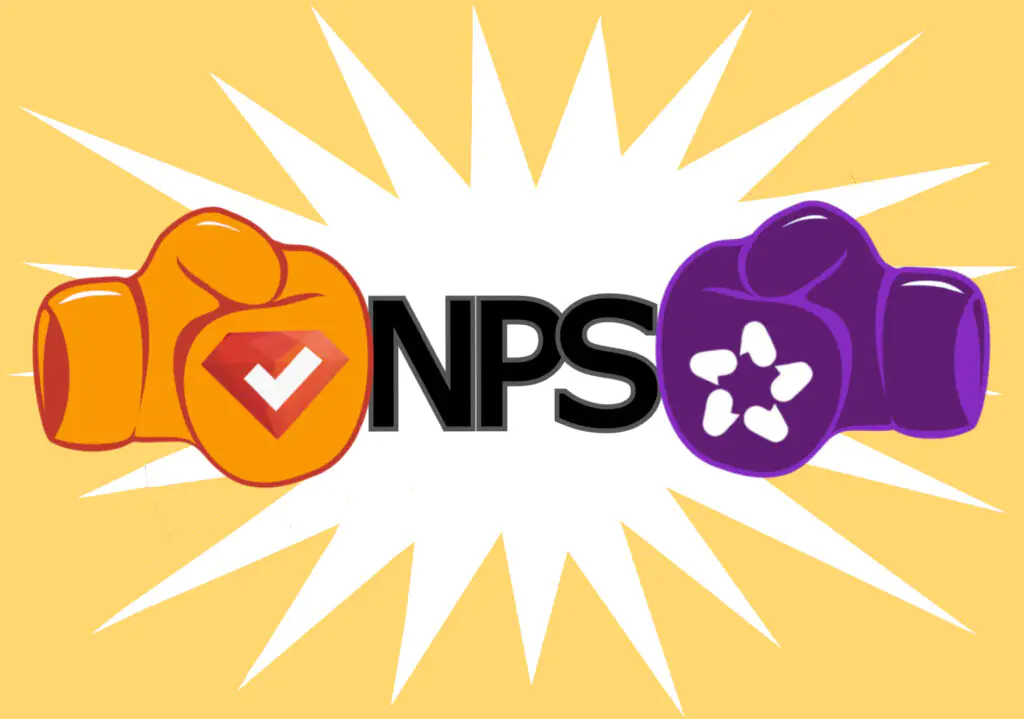“Shoot me a text…” It’s something we hear or say just about every day. And, most of us are quick to respond – or at least take a look – the moment a text message comes through on our phone. This makes texting one of the most widely used communication tools globally. And, because SMS texting is supported by virtually all mobile phones and carriers, even without an internet connection, it is an ideal way to send surveys and get higher than average response rates. So let’s dive into the world of SMS test surveys!
Create Your SMS Text Survey Now For FREE!
SMS Texting Definition & Key Features
SMS (Short Message Service) texting is a method of sending short text-based messages between mobile devices. This tool is used by 5 billion people globally, making it one of the most universal methods of communication. While all age groups use SMS texting, young adults are unsurprisingly the heaviest users of this too; however, even 85% of those 50 and up use it weekly.
Some key features of SMS texting include:
- Message Length: SMS messages are limited to 160 characters per message. Longer messages are often split into multiple parts and reassembled by the recipient’s phone.
- Delivery: SMS messages are sent through cellular networks and do not require an internet connection. This makes SMS texting especially popular in regions with lower smartphone penetration, as it doesn’t require users to be online.
- Global Compatibility: SMS works across all mobile devices and carriers, making it universally accessible.
- Cost: Depending on your mobile plan, SMS may be included in your package, charged per message, or come with a limited quota.
SMS texts are typically used for personal communication (quick messages between friends and family), business communication (appointment reminders, two-factor authentication (2FA) codes, or marketing campaigns), and alerts and notifications (updates from service providers, banks, government agencies, and so on).
It’s important to understand that unlike modern messaging apps like WhatsApp, iMessage, or Messenger, SMS does not support advanced features like read receipts, multimedia sharing (handled by MMS), or group chats. Despite this, it remains a reliable and straightforward communication tool.
SMS Texting Statistics
Here are some of our favorite SMS text statistics. You can find even more SMS stats here.
Open/Response Rates:
- SMS messages boast a 98% open rate compared to email’s 20-30%.
- SMS has a 45% response rate, compared to email’s 6%
- Read Rates: 90% of SMS messages are read within three minutes of delivery
- 62% of cellphone users check for new messages immediately after waking up
Consumer Preferences:
- 75% of adults prefer SMS over other communication channels
- 70% of consumers say SMS is a good way for businesses to get their attention
Conversion/Purchase Rate:
- SMS campaigns have a conversion rate of 29%, higher than other marketing channels
- 50% of U.S. consumers make direct purchases after receiving an SMS with a discount or promo code.
- Surveys conducted via SMS have response rates 5-10 times higher than those conducted via email.
Sending Surveys Through SMS Text
Look at that last stat from above one more time again: SMS surveys have response rates 5-10 times higher than those conducted via email. Whoa! This makes sending SMS text surveys an effective and direct way to engage users, collect feedback, or gather data. Some businesses that may only have an NPS Question to ask may simply send an under 160-character text like this in which the recipient texts back a numerical response:
Thanks for visiting. Please let us know how we did by texting back your satisfaction on a 1-10 scale (10 being best).
However, often one question is not enough to provide any really valuable insight. So, savvy businesses are now sending SMS texts that include a link to a survey. It’s the best of both worlds; they get the high open and engagement, and link directly to a quality survey like SurveyLegend to get more valuable data.
Here’s how it works and what you need to consider.
- Choose an SMS Service Provider: You can send surveys and survey links from any provider, you may just make your selection based on who you currently use, pricing for bulk sends, tracking capabilities, liability stake, and so on.
- Design the Survey: Choose an online survey platform such as SurveyLegend and create your survey within their platform. Once your survey is created, copy the link provided by the survey platform.
- Compose Your SMS Text Message: Write the text message that will be sent to people via SMS. Remember to keep the message limited to 160 characters.
- Insert Your Link: Insert the link that you copied from the survey platform at the end of your SMS text message.
- Send the Survey: Send your survey to individuals or use bulk messaging tools for large audiences. Personalize messages when possible to increase engagement!
- Track Responses: Analyze responses in real-time through your SMS platform survey platforms like SurveyLegend also allow you to watch as the results roll in.
Pros & Cons of SMS Texting
While we’ve touched on some of these already, here is a nice breakdown of the advantages and disadvantages of SMS texting. All are something to consider if you plan to use SMS texting to send surveys, but you’ll note that many of the negatives don’t apply when sending surveys!
Pros of SMS Texting
- High Open Rates: Users are more likely to engage with SMS messages, propelling their open rates to 98%, far greater than email or push notifications.
- Wide Accessibility: SMS works across all mobile devices regardless of model and can reach virtually anyone in the world with a mobile phone.
- Fast Delivery & Response: Messages are delivered instantly and most responses occur within 90 seconds.
- Cost-Effective: SMS is low cost compared to traditional marketing, especially for bulk messaging
- Easy Offline Capability: SMS texting is easy to use and no additional app or system is required. Plus, SMS doesn’t require an internet connection, making it ideal for areas with limited connectivity.
Cons of SMS Texting
- Character Limit: You’re limited to 160 characters per message (longer messages are split or truncated). However, this doesn’t tend to impact surveys, as you will be adding a link to click that takes them to the survey where more detail can be provided if necessary (still, try to keep the survey short too, or consider a microsurvey).
- No Rich Media: SMS cannot contain images, videos, or complex formatting unless using MMS. However, you can include a SurveyLegend link, which will take them to our platform where you can customize the page however you like.
- Spam and Abuse: SMS is increasingly targeted by spammers, leading to consumer frustration and stricter regulations. For SurveyLegend users sending links to customers, it’s important to not make your text appear spammy (it helps if you know the person you’re sending the link to, e.g. a doctor’s office texting a patient) and to adhere to legal compliance best practices (we highlight five of them further down in this blog).
- Lack of Advanced Features: Compared to apps like WhatsApp or iMessage, SMS lacks features like group chats, read receipts, and encryption. However, surveys are sent to individuals, and the SurveyLegend platform lets you know when someone has taken a survey and it is highly encrypted for security.
- Limited Analytics: Unlike email or app notifications, SMS offers limited tracking for open rates or user behavior. This doesn’t apply to the SurveyLegend link however; you will be provided with robust analytics and data through our platform making analysis of results tabulation a cinch.
SMS Texting Legal Compliance Issues
Because SMS texting provides a direct line of communication with an individual, it can be heavily scrutinized when businesses and organizations use it. There are various legal requirements and regulations in place to protect consumers from spam, privacy violations, and unsolicited messages. And while it can be tempting to ignore some of these regulations, it’s important to be aware that if you’re caught or reported, violations of SMS regulations carry some hefty fines. For example, under the TCPA, penalties for non-compliant texts can range from $500 to $1,500 per message.
That’s not all. Businesses and other organizations may face individual or class-action lawsuits for breaches, particularly in regions with stringent consumer protection laws. Here’s a look at the key legal issues and guidelines to be aware of when deploying SMS text surveys.
1. Consent Requirements
Most jurisdictions require businesses to obtain explicit consent from recipients before sending SMS messages. For example, in the U.S., the Telephone Consumer Protection Act (TCPA) mandates prior written consent for marketing texts, while in the EU, the General Data Protection Regulation (GDPR) states that consent must be clear, informed, and specific. In some cases, users must confirm their consent twice (e.g., filling out a form and then replying to a confirmation text). This is called a “Double Opt-In.”
2. Message Content
SMS messages must clearly identify the sender and the purpose of the message and include an opt-out option (read more in our blog on Opt-Outs). This means there must be instructions on how recipients can stop receiving messages, such as “Reply STOP to unsubscribe.” Businesses and organizations must also be careful not to send prohibited content, such as messages with deceptive, fraudulent, or illegal content.
3. Timing Restrictions
Some regulations restrict sending messages during certain hours. For instance, the TCPA prohibits SMS messages between 9 PM and 8 AM in the recipient’s local time.
4. Data Protection and Privacy
Businesses must protect recipients’ data and comply with local data protection laws (e.g., GDPR, CCPA). They should only collect the information necessary for communication and avoid sharing it with third parties without consent.
5. Bulk Messaging Rules
Many jurisdictions have laws that limit or regulate bulk SMS campaigns to prevent spam (e.g., the CAN-SPAM Act in the U.S.). Cellular carriers may also impose additional rules for bulk messaging, including registration requirements for SMS campaigns.
Best Practices for SMS Texting Legal Compliance
In a nutshell, here are the five pieces of good advice to remember when sending your next SMS text survey.
- Obtain Explicit Consent: Use clear opt-in methods and keep records of consent.
- Provide Opt-Out Options: Make it easy for users to unsubscribe from messages.
- Comply with Time Restrictions: Send messages only during legally permissible hours.
- Review Content: Ensure all messages are accurate, transparent, and non-deceptive.
- Monitor and Audit: Regularly review SMS practices to ensure compliance with evolving laws.
By following these guidelines and staying informed about local regulations, businesses and organizations can send surveys via SMS texting effectively and legally.
Example of an SMS Survey
Here’s an example of how an SMS Text for a survey may read. In this example, a financial institution is sending a customer a survey to better understand their student loan needs. As you see, the text message is short and concise, almost like a social media post, followed by a link to a SurveyLegend survey. Go ahead and click the link in the text below just as someone receiving this message would; the survey is live, so you can experience their entire journey right now.
Conclusion
SMS surveys boast response rates 5-10 times higher than email surveys. This makes them an exceptionally effective method for engaging users, collecting feedback, and gathering data. While a simple NPS question can be asked directly via text, savvy businesses are enhancing their approach by including links to more comprehensive surveys. This strategy combines the high engagement of SMS with the depth of insight from detailed survey platforms like SurveyLegend, maximizing both response rates and the quality of collected data. Start today with SurveyLegend for free!
Do you regularly receive SMS text messages? If so, are they usually relevant to you (e.g., a text asking about your recent purchase). Either way, did you engage with the AI Or just hang up?
Create Your SMS Text Survey Now For FREE!
Frequently Asked Questions (FAQs}
When is SMS texting most effective?
SMS texting is great for simple, direct communication with high engagement. Time-sensitive messages (e.g., reminders, alerts, or promotions) are also ideal for SMS texts. Therefore, it’s a great way for businesses to send surveys. For example, a follow-up survey after a customer has visited a store, made a purchase, and so on.
Why are SMS texts so much more heavily scrutinized versus email and other communication tools?
SMS texts are more heavily scrutinized because they are a highly personal and immediate form of communication, delivered directly to a user’s mobile device. Unlike email, which can be filtered into folders or overlooked, SMS messages demand attention and often interrupt the recipient’s current activity.
What happens if you don’t comply with regulations regarding sending SMS texts?
Businesses that fail to comply with strict SMS texting regulations could face serious fines. Violating these regulations can result in fines ranging from $500 to $1,500 per message. Additionally, non-compliance may expose businesses to individual or class-action lawsuits, especially in areas with stringent consumer protection laws.






